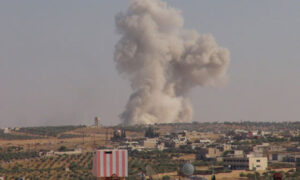Watchdog claims video evidence shows government forces dropped Soviet-era cluster bombs in bid to halt rebel advances.
 Syrian government forces have used Russian-made cluster bombs on populated areas in their effort to push back rebel advances along the country’s main north-south highway, according to Human Rights Watch.
Syrian government forces have used Russian-made cluster bombs on populated areas in their effort to push back rebel advances along the country’s main north-south highway, according to Human Rights Watch.
The watchdog on Sunday pointed to videos put up on the internetshowing bomblets from cluster munitions in Idlib, Homs, Aleppo and Latakia provinces and outside Damascus. It said interviews with witnesses backed up the video evidence and there were clear signs the weapons had been dropped from aircraft.
The allegations came as President Bashar al-Assad’s government was struggling to stop opposition forces consolidating their hold on Idlib province, on the Turkish border. The rebels were reported to have surrounded an army garrison of several hundred men at Urum al-Sughra, between the contested city of Aleppo, the country’s commercial and industrial centre, and the frontier.
“Rebels attacked an armoured column sent from Aleppo to rescue the 46th Regiment at Urum al-Sughra and stopped it in its tracks,” Firas Fuleifel, an opposition activist told Reuters by phone from Idlib. He said a Syrian air force jet was shot down while trying to provide air support to the column.
Sunday’s Human Rights Watch report said there were Soviet-era markings on the cluster bombs used over the past few days but it was unclear when they had been delivered to Syria. Russia continued to be Syria’s main arms suppliers after the demise of the Soviet Union.
More than 100 countries have signed a treaty banning the use of cluster bombs on the grounds that they are indiscriminate weapons and unexploded bomblets scattered across a wide area in the wake of an attack pose an unacceptable threat to civilians. Neither Syria nor Russia has signed the 2010 treaty. Nor have China and the US.
“Syria’s disregard for its civilian population is all too evident in its air campaign, which now apparently includes dropping these deadly cluster bombs into populated areas,” said Steve Goose, arms director at Human Rights Watch. “Cluster bombs have been comprehensively banned by most nations, and Syria should immediately stop all use of these indiscriminate weapons that continue to kill and maim for years.”
Turkey closed its airspace to Syrian airliners on Saturday, four days after it claimed to have found weaponry on a Syrian Air Airbus flying to Damascus from Moscow, which Turkish warplanes forced to land on suspicion of gun-running. The Russian government insisted the plane had been carrying legal radar components in its hold, but Turkey said the consignment included missile parts. The Russian newspaper Kommersant said the consignment had been sent by a company in the Russian city of Tula, which manufactures missiles and radar equipment.
Following the Airbus incident on 10 October, Syria accused Turkey of “piracy” and banned Turkish overflights on Saturday. Turkey had stopped using Syrian airspace some months previously and its foreign minister, Ahmet Davutoglu, said on Sunday: “The Syrian announcement has no value for us.”
The Airbus incident was a low point in the Turkish-Russian relationship, which has been severely strained by the conflict in Syria. The Turkish prime minister, Recep Tayyip Erdogan, lambasted the UN security council at a conference in Istanbul for its failure to intervene in the Syrian conflict, in what was regarded as thinly-veiled criticism of Russia and China, which have vetoed any direct pressure on Assad’s regime.
“The UNS security council has not intervened in the human tragedy that has been going on in Syria for 20 months,” he said. “There’s an attitude that encourages, gives the green light to, Assad to kill tens or hundreds of people every day,” he said.
(The Guardian)













